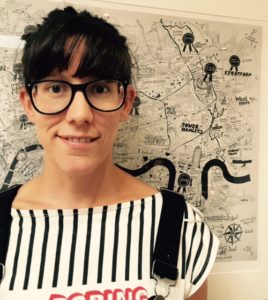As the end of my PhD funding loomed ominously closer I felt reassured that I wouldn’t be “falling off the edge” as so many people described it. At the start of my NIHR funded doctoral research fellowship I had gotten to know three other NIHR funded clinical academic speech and language therapists all a couple of years ahead of me in their PhD journey. All of us had clinical backgrounds and academic interests, but all in different areas of speech and language therapy. These three other SLTs were wonderful inspirations and role models, and a key piece of advice they gave me was to plan well in advance what you will do after your funding or PhD finishes. Stop yourself from falling off the edge.

Thanks to Curtis MacNewton for sharing their work on Unsplash.
A key piece of advice from each and every one of these SLTs had been: beware going back to your old pre-PhD job. Each of them had done so. Generally reporting negative experiences. So, I planned hard. I realised very quickly that I couldn’t finish my PhD AND apply for funding that would seamlessly maintain me in a research role. I wasn’t going to finish my PhD before my funding ran out for starters. But I really wanted one of those clinical academic careers that seem to work so well in medicine. So, I started working on creating my own combination.
First off, I worked with my wonderful mentors at the Cognitive Disorders Clinic at the National Hospital for Neurology and Neurosurgery, where the service was severely lacking a speech and language therapist with knowledge of language led dementias. This is where all the networking paid off. I had done a number of talks, supported the rare dementia support groups and developed great relationships with people working there already. I started early and secured myself a clinical role that I was able to transition into when my funding finished (whilst I continued working on finishing my PhD).
Secondly, I managed to secure a one day per week contract as a teaching fellow in my department, teaching the SLT students about dementia, and the psychology students about qualitative methods. The jigsaw was starting to fit.
Thirdly, I started looking back at the NIHR awards and realised that there was a brief window of opportunity where I would be eligible for the new NIHR Development Skills Enhancement award. This post-doctoral award is a trainee award that basically requires the university to commit to funding half the costs (mainly the salary costs) and provides additionally funding for training and mentorship. There is a narrow window where people can apply within a year of holding a previous NIHR award but only after having submitted their thesis. Given my NIHR DRF funding finished end of September 2019, and I submitted my thesis end of December 2019, I worked out that I should aim to apply for the Spring or Summer round in 2020 (there is currently a deadline every 3 months).

Thanks to Chris Liverani for sharing their work on Unsplash.
My first and biggest hurdle was to get the commitment from my department. I was the first person to go for this award in the department and I needed to convince them I was worth it. I did a bit of detective work and spoke to a recently successful awardee, a radiologist. She gave me lots of useful guidance on considering the justification for why I couldn’t just apply for a clinical lectureship or post-doctoral fellowship. I found my final chapters of my thesis rather helpful as I started to draft the story for what I needed next for my research and training. One of the key areas I needed to focus on was outcome measures. I developed and piloted a speech and language therapy intervention for people with primary progressive aphasia during my PhD, and before I could consider an effectiveness evaluation I needed to complete the analysis of all my outcomes, which I hadn’t had time to do during my PhD. I also wanted to know what the most important and meaningful measures were for the participants. Alongside this I needed to develop my knowledge of implementation science and trials methods for the next application. This was my basic “story”. My mentors were incredibly supportive and generous with their time and ideas, it felt like a reasonable application.
As it turned out the award deadline fell in the first months of the COVID-19 pandemic and the department was unable to support me. But then, in the eleventh hour were able to support me after all, and in a final rush (on the morning of my PhD viva) I submitted my application. Having this promptly forgotten about this I found out in June that I had been successful. This final piece in my clinical-academic puzzle makes me feel that I am on route to the career I would like, am passionate about and most importantly will mean I can continue to develop clinical relevant research.
I am due to start the award in October and I am so excited. I will reduce my clinical time a little, but as of October I will be a clinical-academic-teaching SLT!
Author [1]
[1]
Dr Anna Volkmer [2] is a Speech and Language Therapist and researcher in Language and Cognition, Department of Psychology and Language Sciences, University College London [3]. Anna is researching Speech and language therapy interventions in language led dementia and was once voted scariest speech and language therapist (even her children agree).